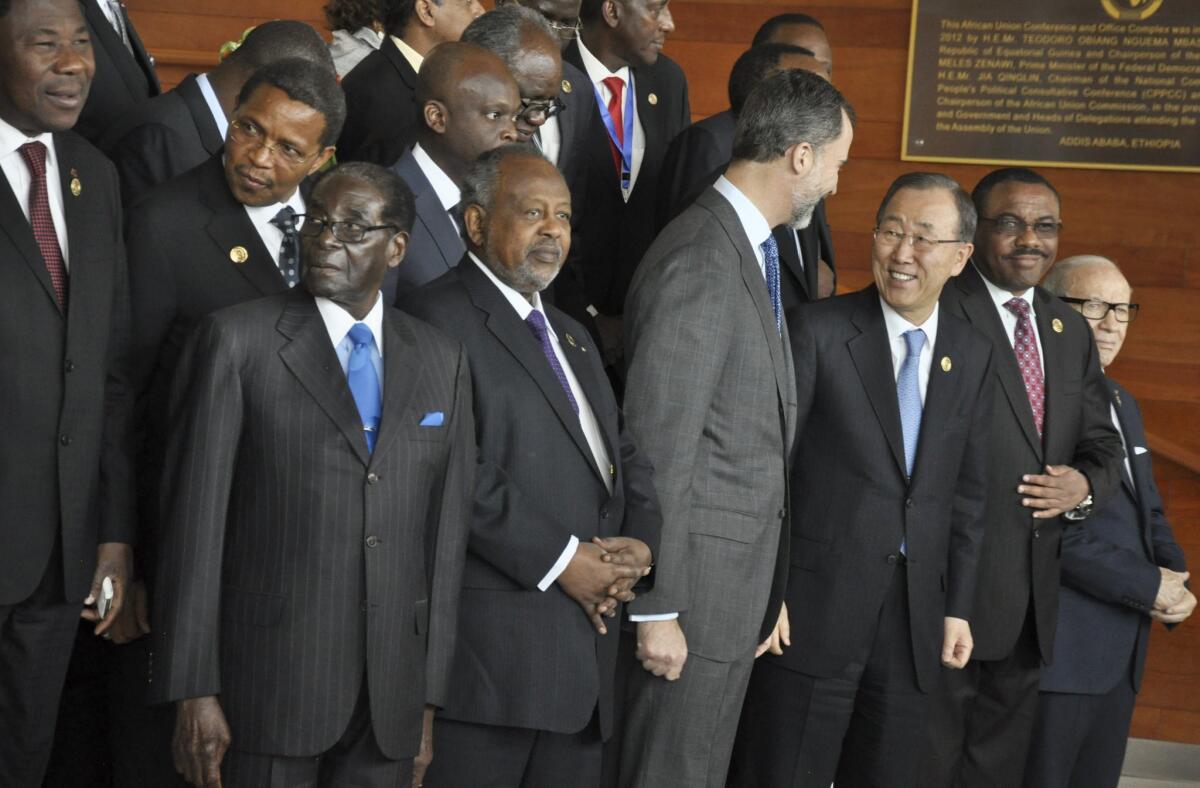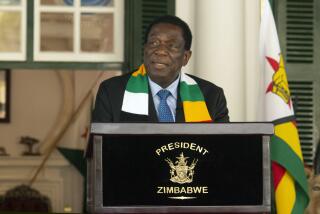Zimbabwe’s Mugabe to head African Union, despite rights record

Zimbabwean President Robert Mugabe, front left, poses with other leaders at the annual African Union summit in Addis Ababa, Ethiopia, on Friday.
- Share via
Reporting from Johannesburg, South Africa — Zimbabwean President Robert Mugabe, who came to power in 1980 and has been accused of significant human rights abuses in his country for much of his rule, was elected Friday as chairman of the African Union.
Mugabe’s election comes amid a backlash in Africa against Western leaders lecturing Africans on democracy and human rights -- and while the continent cozies up to China, which is happy to pour in no-strings-attached aid.
It also comes with the continent appearing to backslide on democracy, with numerous presidents maneuvering to ditch constitutional limits on presidential terms in order to rule for life.
Mugabe, freedom fighter turned president, faces travel bans to the United States and Europe because of his country’s poor human rights record. In previous elections, opposition activists have been beaten or killed, questionable electoral rolls have been used and rights groups have alleged that food aid has been denied to opposition areas.
“By electing me to preside over this august body, with full knowledge of the onerous responsibility that lies ahead, I humbly accept your collective decision,” said the Zimbabwean president, who turns 91 next month.
He delivered one of his trademark slaps against the West, saying, “African resources should belong to Africa and to no one else, except to those we invite as friends. Friends we shall have, yes, but imperialists and colonialists no more.”
His spokesman, George Charamba, told Zimbabwe television on Thursday that Mugabe was concerned the continent’s leaders were trying to bend their policies to please the West and he would urge a more robust, independent stance from the African Union.
“He thinks that for a long time we have been kowtowing to Western interests,” said Charamba. “He thinks we have been trying, as it were, to bend our policies so as to win the goodwill of the West.”
Mugabe told African leaders his land reform program, criticized in the West after the collapse of agriculture set back the economy years, had been successful because it put land in black hands and empowered black farmers. He said Zimbabwe’s tobacco industry was now thriving.
In 1984, Mugabe launched a military operation against opposition strongholds in southern Zimbabwe with the North Korean-trained 5th Brigade. The sweep killed an estimated 20,000 civilians.
In 2005, he attacked urban opposition strongholds by ordering mass evictions, leaving 700,000 people homeless, according to United Nations estimates. His government set up a youth militia, known as the “green bombers,” which abducted women as sex slaves and beat up, tortured and killed opposition activists, according to human rights groups, opposition figures and independent journalists. The violence was particularly pronounced before elections.
Mugabe, who is also currently chairman of the Southern African Development Community, took over the largely symbolic AU post because of a rotational system that meant the new leader had to come from southern Africa.
Zimbabwe’s independent Newsday newspaper criticized Mugabe’s widely expected election in an editorial Thursday.
“Mugabe, who has trampled on people’s human rights in Zimbabwe the greater part of his 35-year rule, will definitely not add any value to society,” the newspaper said. “Mugabe has stayed in power largely through election rigging and the arrest and intimidation of opponents. His reelection in the disputed and violent 2008 poll was especially controversial.
“But he has company in the AU,” the newspaper added. “Hence, his appointment simply shows the AU is a ‘dictators’ club’ given Equatorial Guinea President Teodoro Obiang Nguema Mbasogo and Angola’s Jose Eduardo dos Santos have been in office longer than Mugabe himself.”
Mugabe has indicated he may run for election again in 2018 and once told journalists he planned to rule until he was 100.
Follow @robyndixon_LAT for news out of Africa
More to Read
Sign up for Essential California
The most important California stories and recommendations in your inbox every morning.
You may occasionally receive promotional content from the Los Angeles Times.













